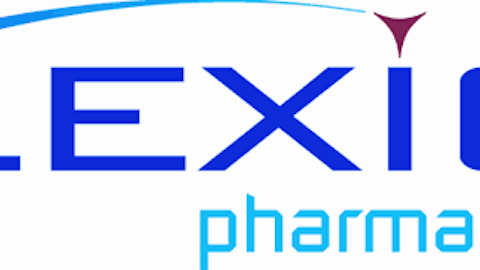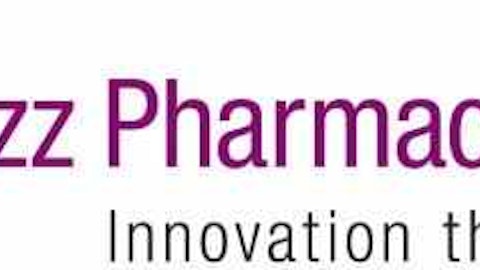
However, with patents expiring on important drugs, soaring competition, and disappointment over first quarter sales, perception of investors about Merck & Co., Inc. (NYSE:MRK) has not been too favorable of late. But this can change fast if you consider the underlying factors that I am highlighting below.
Januvia sales may pick up in the US
During the first quarter, Merck’s sales fell by 9% to $10.67 billion, trailing the $11.09 billion expected by analysts at Thomson Reuters. The 75% drop in the sales of allergy drug Singulair, for which the patent expired last year, was a key culprit for the sales slide, but analysts had seen this coming. Singulair sales at $337 million were just $10 million short of analyst estimates.
The real disappointment was the sales of Januvia and Janumet, Merck & Co., Inc. (NYSE:MRK)’s diabetes drugs. The two drugs had sales of $884 million and $409 million which lagged analysts’ expectations by 18.9% and 10.5%, respectively. This was triggered by a 5% sales decline in the U.S. on a consolidated basis. Outside the U.S., the sales showed a strong 7% growth excluding currency impact.
So, it is safe to conclude that the U.S. sales of these drugs will play a key role in determining the company’s future prospects. Management had pointed out that the U.S. sales were affected by inventory reductions at its customers’ ends and is therefore not a true indication of the demand.
Prescription data from IMS Health has shown that sales of this drug to consumers were actually up by 4%. According to Merck’s own estimates, without the inventory reduction, sales of Januvia would actually have been up by 5%.
So, we might see a change in the numbers in the second quarter. The company holds 75% of the U.S. market and management had promised to deploy more resources for developing the Januvia franchise.
Solid position in emerging markets
Merck & Co., Inc. (NYSE:MRK) is building its presence in the big emerging markets like China, Brazil, Asia Pacific, India, and Russia. During the first quarter, sales in emerging markets grew by 8% excluding currencies to $1.9 billion and accounted for 21% of total pharmaceutical sales.
In 2012, China sales had crossed the $1 billion threshold for the first time, and in the first quarter they were up a solid 21%. The company has opened a new manufacturing facility in Hangzhou, China to supply medicines to China and the Asia-Pacific region at lower cost.
Merck is the second leading pharmaceutical company in Latin America, marketing six of the 20 most widely sold medicines in the region. The company has recently, announced its joint venture with SuperaFarma, a Brazilian pharmaceutical company to boost market share.
Coming back to Januvia and Janumet again, these two are the second largest brands in Korea and India among oral diabetes medicines. Global sales of diabetes medicines totaled $35 billion last year and could rise to as much as $48 billion by 2015, according to research firm IMS Health. Growth is especially strong in countries such as China, India, Mexico and Brazil.
So, emerging markets will continue to drive growth for Merck & Co., Inc. (NYSE:MRK).
Strong pipeline
Merck & Co., Inc. (NYSE:MRK) has good pipeline in segments like insomnia and cancer, which carry significant potential. The global insomnia market is estimated to be around $3.3 billion in size with the U.S. and Japan making up three-fourths of this market. Merck is preparing to launch its new insomnia drug, Suvorexant, in these two all-important markets.
The FDA’s conclusion is that the drug is effective in inducing and maintaining sleep and requires the company to conduct another trial on the 10 mg dose ahead of a formal decision. This gives Merck & Co., Inc. (NYSE:MRK) a boost in its quest for final approval.
Meanwhile, Lambrolizumab, Merck’s cancer drug, has received ‘breakthrough’ therapy status from the FDA for the treatment of advanced melanoma. Advanced melanoma accounts for more than 80% of skin cancer-related deaths and 1%-2% of all cancer deaths in the U.S. alone. The breakthrough status will allow the company to expedite the development of this drug.
Another important drug in Merck & Co., Inc. (NYSE:MRK)’s pipeline is Vintafolide, which is a therapy for ovarian cancer and is already under review by European regulators. Its cholesterol drug Vytorin, was recently deemed safe enough to continue a trial.
Valuation
Let us compare Merck’s prospects with that of its peers, Pfizer Inc. (NYSE:PFE) and Novartis AG (ADR) (NYSE:NVS).
Last year, Novartis AG (ADR) (NYSE:NVS) toppled Pfizer Inc. (NYSE:PFE) from its position as the leading global drug marker and is currently best placed among the three. Analysts predict 1.3% revenue growth to $57.4 billion this year. There is also a lot of excitement over its announcement that it has met all objectives in a clinical study for a psoriasis treatment.
Meanwhile, Pfizer is the hardest hit with patents expiring for some of its best selling drugs. The cholesterol fighting drug, Lipitor, which once generated $13.5 billion in annual sales, brought in only $626 million in the first quarter. The patent for this drug expired in 2011. And in June, the UK patent expired for another bestseller, Viagra. Analysts’ expect Pfizer Inc. (NYSE:PFE)’s total sales to fall by 11.9% to $52 billion this year.
Analysts’ expect Merck & Co., Inc. (NYSE:MRK) to report a modest 4% revenue slippage this year to $45 billion and get to around $45.5 billion level in 2014. This compares with the $47 billion sales that the company saw in 2012.
While, Novartis AG (ADR) (NYSE:NVS) is the best placed among the three it is also the most expensive with a forward price-to-earnings ratio of 13.17. Pfizer Inc. (NYSE:PFE) is the cheapest with forward price-to-earnings ratio of 12.12, but is facing too many uncertainties.
Merck, with its forward price-to-earnings ratio of 12.73 is a good alternative and can see reasonable upsides over the coming months. Moreover, the additional $15 billion share repurchases that the board approved and the solid 3.6% dividend yield are good extra incentives for owning the stock.
Last word
No doubt, Merck & Co., Inc. (NYSE:MRK) is facing challenges, but it still has good prospects in the form of increasing presence in emerging markets and a strong pipeline. A pickup in the sales of Januvia and Janumet drugs in the U.S. can help it meet analyst estimates. Given its valuation and considering the upsides that are possible, investors can definitely remain upbeat about the stock.
The article This Pharmaceutical Company Is Poised for Wellness originally appeared on Fool.com.
Eshna De has no position in any stocks mentioned. The Motley Fool has no position in any of the stocks mentioned. Eshna is a member of The Motley Fool Blog Network — entries represent the personal opinion of the blogger and are not formally edited.
Copyright © 1995 – 2013 The Motley Fool, LLC. All rights reserved. The Motley Fool has a disclosure policy.




